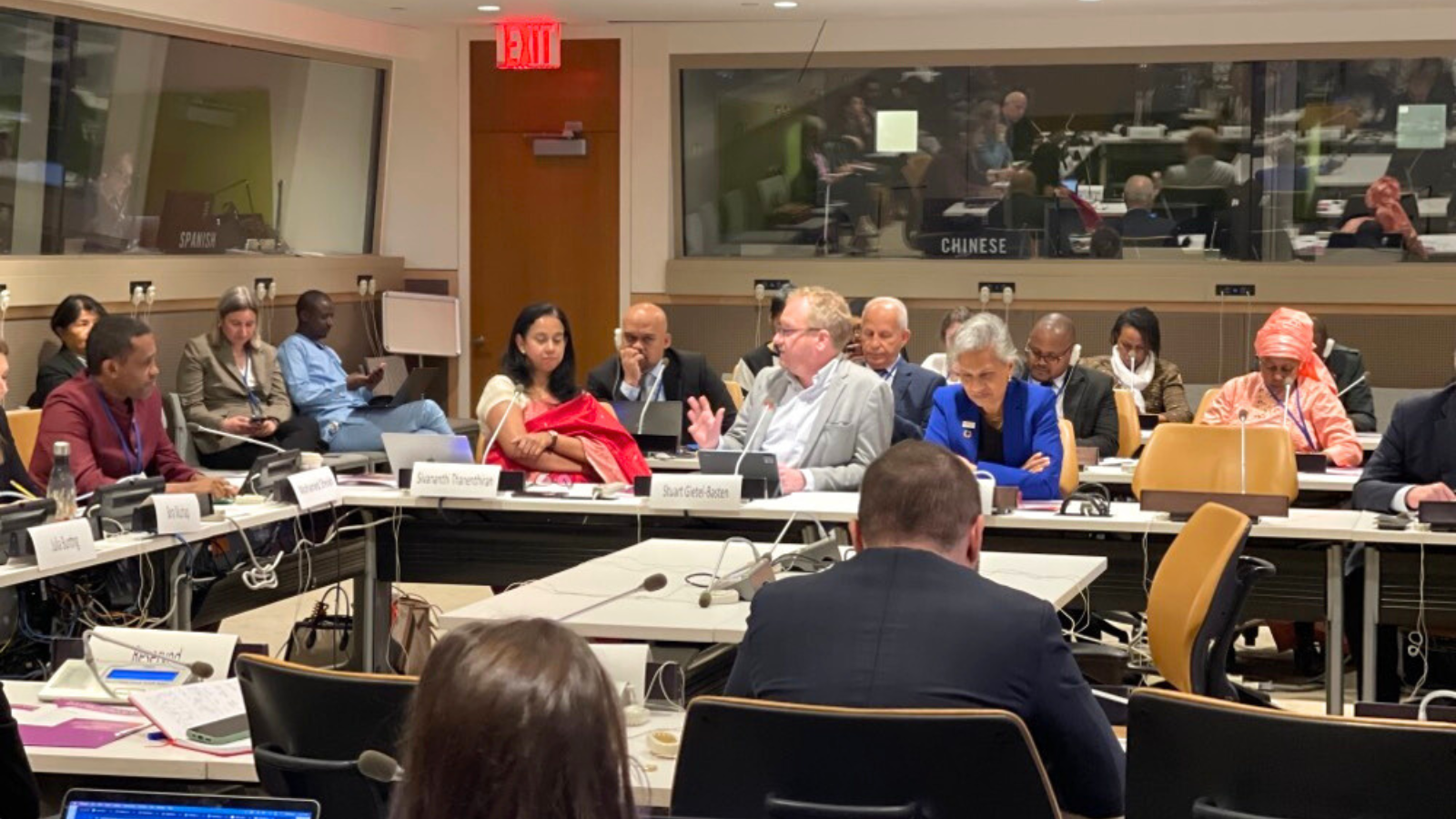
The lingering anxiety around the “p” word
This year’s 57th session on Population and Development wasn’t just any ordinary convening. It marked a significant milestone: the 30th anniversary of the landmark Programme of Action’s adoption in Cairo, in 1994. To commemorate this occasion, countries gathered to share their successes and challenges in tackling population issues over the past three decades. Our Content and Campaigns Specialist, Florence Blondel, was there.
In brief
- Population Matters, Population Connection and Population Media Center read a joint statement.
- Member States agreed on the political declaration to be adopted, a process which we were a part of during consultations.
- Demographic anxieties – from declining to rising populations.
- Insightful side events where we got the floor, and connections.

30 years of a rights-based approach
The International Conference on Population and Development (ICPD), for 30 years, has been the foundation for a global approach to population and development. It considers factors beyond birth rates and emphasises individual rights, especially for women, in reproductive health choices. This approach has shaped policies tackling population growth, maternal health, gender equality, and education access.
When we leave the P out of the ICPD, we cannot achieve the goals of the ICPD…“
Dr Kanyoro Musimbi, Former CEO Global Fund for Women
Population was discussed but in the political declaration that was adopted, the ‘P’ word was somewhat cast aside. It excluded three prior points, including one that emphasised research on population’s connection to sustainable development, and incorporating population trends into development plans.

REAL TALK
In 1994, the world’s population stood at 5.6 billion. It is now over 8.1 billion, and it keeps growing. We must prepare for continued population growth in sub-Saharan Africa – and slow growth or decline in much of Asia, Europe and Northern America, and later, in Latin America and the Caribbean.”
Amina Mohammed, UN Deputy Secretary-General
Amina set the tone at the 57th session’s opening with her remarks. These issues, especially population decline, dominated discussions throughout the event. Many participants referred to them as sources of “demographic anxieties”.
In his keynote speech, Past and Future Demographic Trends: Fears, Facts and Policy Implication, Jose Miguel Guzman, President and Founder of NoBrainerData, warned that excessive and irrational fear, especially concerning older populations hinders clear thinking and effective decision-making. He highlighted four demographic challenges:
- Population decline
- Very low fertility
- Rapid ageing
- International migration
For some, a population reduction would be positive both for the economy and the environment and therefore, they think governments need to start planning for a world where population is declining. Others consider that there are more negative than positive implications and, thus, the need to increase fertility and, incentivise immigration.“
Jose Miguel Guzman
AN OLDER WORLD: DECLINING AND AGEING POPULATIONS
The global population of older persons above 65 years is expected to double by 2050, reaching an estimated 1.5 billion. This “ageing” phenomenon, once seen as a problem mainly for wealthy nations, is now a major concern for all countries, especially lower-middle income ones where the absolute numbers of older people will be concentrated. Experts acknowledge that an ageing population brings a wave of issues: higher healthcare needs, fewer young workers, strained pension systems, and a surge in demand for social services.
These kinds of issues are to be addressed in their own right and not taken and kind of packaged up, sometimes with ethno-nationalist narratives, sometimes with conservative gendered worldviews, and used as a justification, as a kind of macroeconomic justification for pushing back gains in reproductive and sexual health, reproductive autonomy and the empowerment of women and girls.“
Professor Stuart Gietel-Basten, Professor of Social Science

In many countries now, there are attempts to increase fertility and reverse population decline or to slow the pace of population ageing. Iran’s representative quoted studies saying, “in the absence of proactive policy interventions, their fertility rate is anticipated to plateau below the replacement level”. Iran regrets what it now calls “implementing stringent family planning policies” since Cairo and is warning countries not to fall into a “population trap”. It is among the eight countries we monitor in our Gilead Watch campaign.
Professor Stuart and other experts caution against using these demographic anxieties to justify policies which restrict reproductive rights or blame younger generations for societal problems.
It’s very hard to imagine a situation where having more babies is the most effective response to these kinds of challenges. I know, I feel like it’s become a catchphrase. I need to keep reminding people that babies don’t work. Babies are quite lazy in that regard. They don’t pay tax. So we have children born today will not enter the labour market until maybe 2043.“
Li Junhua, the Under Secretary-General for UN DESA proposed focusing on lifelong learning and affordable preventative healthcare for all ages.
A YOUNGER REGION: THE CHALLENGE OF BOOMING POPULATIONS
While the world experiences longer lifespans and smaller families, some regions, particularly Sub-Saharan Africa, face the challenge of rapid population growth. By 2050, one in four people globally will be African. AFIDEP’s Dr. Eliya Zulu emphasises the urgency of addressing this issue, “You can’t wish away these big numbers.” Africa and the world must act fast to leverage its growing population for development.
And it’s Nigeria that leads the charge. It wasn’t lost on the National Population Commission (NPC) Chair, the Honourable Nasir Isa Kwarra, that his country tops the list. In a side conversation with us, he admitted that:
Nigeria’s population is growing very fast, we are working on reducing the total fertility rate, working on the cultural elements that make it difficult for us to slow population growth. It takes time but we will continue to invest in girl child education up to tertiary level, buy her time to make reproductive choices at her pace.”

Zambia, another country with a staggering 3.5 per cent annual growth rate, is a prime example. Charles Banda, Head of Population Development and Planning, calls it one of the world’s “fastest-growing populations.” However, he highlights a unique aspect:
This growth creates another challenge. Others call it a youth bulge, but I call it a child bulge. Nearly half [46%] of Zambia’s population is under 15.”
Africa has a roadmap for achieving the ICPD goals: the Addis Ababa Declaration on Population and Development. However, progress remains slow or even stagnant in some cases. Banda emphasises this, pointing out that Zambia’s young median age of 17 hinders development compared to countries like the USA with a median age closer to 40.
THE NEXT 30 YEARS: MEGATRENDS
In one of the side events we attended organised by UNFPA, five visionary think pieces exploring how key ICPD themes are shaping the future amid global megatrends were commissioned. I, representing Population Matters, Population Connection, and Population Media Center, raised two crucial questions: how are we increasing funding for family planning to meet the needs of over 250 million women with unmet demand? Are we ready for overconsumption in Africa?

‘OLD’ and new FACES
It was a pleasure catching up with individuals we’ve previously met, such as Dr. Eliya Zulu from AFIDEP, Laeticia Apia from the National Population Council in Ghana, Dr. Betty Kyaddondo and the team from the National Population Council in Uganda and Margaret Edison from the National Population Commission in Nigeria. Margaret’s boss provided us with a brief overview of recent developments in Nigeria, where we recently held a Population Conversation, which Margaret attended.

It was also great to connect with the team from McGill Youth Advisory Delegation. It was thrilling to meet enthusiastic young people interested in our work. We discussed collaboration strategies and our experiences in a challenging field that often deters people in developed nations.

SUMMIT OF THE FUTURE: HOW DO WE PRIORITIsE THE NEEDS OF FUTURE GENERATIONS?
Professor Peter Le Souef is Professor of Paediatrics at the School of Medicine, University of Western Australia. Peter is currently engaged in research commissioned by Population Matters and was part of the PM delegation in New York. Peter identified a key gap in the week’s discussions, the future of children and their rights.
While concerns about children’s well-being are less pronounced in highly developed countries,the situation is vastly different in Sub-Saharan Africa. With projections of 5.5 billion children born there by the end of the century, these countries face immense pressure on their environment and resources. Ensuring a safe and healthy future for these children, including tackling existing malnutrition issues, will be a major challenge.”

Population Matters is urging supporters to advocate for greater commitment to the Sustainable Development Goals through their governments. We specifically emphasise the importance of addressing population growth as part of the discussions during the Summit of the Future. The hope is that leaders will make informed policy decisions based on current demographic trends. These trends, while causing anxieties, should not lead to harmful policies.



